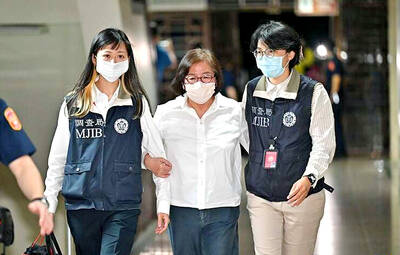Atayal singer Angel Tseng (曾宇辰), who is to sing the theme song of this year’s Summer Universiade during the opening ceremony, on Sunday promoted the Don’t Tag Me! exhibition organized by the Noordhoff Craniofacial Foundation-Taiwan by sharing her experience of overcoming discrimination because of her appearance.
Tseng, 26, was born with a cleft lip and palate, and craniofacial deformity, which led her to be discriminated and called “devil” during her childhood.
Tseng and her six-member band I-Want in November last year beat 264 other groups to win the chance to perform the games’ theme song, Embrace the World.

Photo courtesy of the Noordhoff Craniofacial Foundation-Taiwan
In 2015, she won the hearts of the audience and judges of TV talent show Million Star (星光大道) with her “angel-like singing.”
In interviews, Tseng has talked about her congenital cleft lip and palate and craniofacial deformity, and about how she underwent craniofacial surgery for the first time at four months of age.
Tseng has had more than 20 operations, including one to replace her left eye with an artificial one because of dysplasia, a cell growth condition, she said.
“Luckily, my mom and dad have never seen me as peculiar,” Tseng said.
Thanks to her parents, Tseng said she never thought she was “different” until she attended kindergarten and went grocery shopping with her mother at a local market.
A child on the road had pointed at her, shouting: “That person looks like a devil,” Tseng said.
The word shocked her and hurt her deeply, but her parents had always told her that she was as normal as other people, and that she should stand in front of people with confidence, because she had done nothing wrong, she said..
“Why flinch?” her parents used to ask her, she said.
Being shunned, mocked and given hurtful nicknames by her classmates was part of Tseng’s daily life during her school years, she said.
However, “my mother told me not to call people names in response, but instead to give them a big smile,” Tseng said.
Tseng said that because she loved to sing, her father would often take her to sing in karaoke parlors, but he was opposed to her decision to make singing a career.
Her appearance led to her being ruled out during preliminary interviews for singing contests and not even geting a chance to perform, she said.
Tseng’s father said he used to fear she would experience even more discrimination and frustration than she did in childhood if she were to stand on a big stage.
However, watching her become braver and more fearless each time she suffered a setback, he changed his mind and became more supportive of his girl’s dream, he said.
Knowing that his daughter is to stand on the grand stage of the Taipei Universiade, Tseng’s father said he never dreamed that there would be so many people supporting her.
“She is braver than me,” he added.
Don’t Tag Me! features virtual reality installations that tell the story of exclusion by peers and the feelings of isolation experienced by people with craniofacial disorders. The protagonist is Tseng herself.
The exhibition, which runs through tomorrow, is being held at Warehouse No. 4 of the Songshan Cultural and Creative Park in Taipei. Admission is free.

Costa Rica sent a group of intelligence officials to Taiwan for a short-term training program, the first time the Central American country has done so since the countries ended official diplomatic relations in 2007, a Costa Rican media outlet reported last week. Five officials from the Costa Rican Directorate of Intelligence and Security last month spent 23 days in Taipei undergoing a series of training sessions focused on national security, La Nacion reported on Friday, quoting unnamed sources. The Costa Rican government has not confirmed the report. The Chinese embassy in Costa Rica protested the news, saying in a statement issued the same

Taiwan is to extend its visa-waiver program for Philippine passport holders for another year, starting on Aug. 1, Minister of Foreign Affairs Lin Chia-lung (林佳龍) said on Friday. Lin made the announcement during a reception in Taipei marking the 127th anniversary of Philippine independence and the 50th anniversary of the establishment of the Manila Economic and Cultural Office (MECO) in Taiwan, the Ministry of Foreign Affairs said. The decision reflected Taiwan’s commitment to deepening exchanges with the Philippines, the statement cited Lin as saying, adding that it was a key partner under the New Southbound Policy launched in 2016. Lin also expressed hope

Temperatures in New Taipei City’s Sindian District (新店) climbed past 37°C yesterday, as the Central Weather Administration (CWA) issued heat alerts for 16 municipalities, warning the public of intense heat expected across Taiwan. The hottest location in Taiwan was in Sindian, where the mercury reached 37.5°C at about 2pm, according to CWA data. Taipei’s Shilin District (士林) recorded a temperature of 37.4°C at noon, Taitung County’s Jinfeng Township (金峰) at 12:50 pm logged a temperature of 37.4°C and Miaoli County’s Toufen Township (頭份) reached 36.7°C at 11:40am, the CWA said. The weather agency yesterday issued a yellow level information notice for Taipei, New

CASE: Prosecutors have requested heavy sentences, citing a lack of remorse and the defendants’ role in ‘undermining the country’s democratic foundations’ Five people affiliated with the Chinese Nationalist Party (KMT), including senior staff from the party’s Taipei branch, were indicted yesterday for allegedly forging thousands of signatures to recall two Democratic Progressive Party (DPP) lawmakers. Those indicted include KMT Taipei chapter director Huang Lu Chin-ru (黃呂錦茹), secretary-general Chu Wen-ching (初文卿) and secretary Yao Fu-wen (姚富文), the Taipei District Prosecutors’ Office said in a news release. Prosecutors said the three were responsible for fabricating 5,211 signature forms — 2,537 related to the recall of DPP Legislator Wu Pei-yi (吳沛憶) and 2,674 for DPP Legislator Rosalia Wu (吳思瑤) — with forged entries accounting for